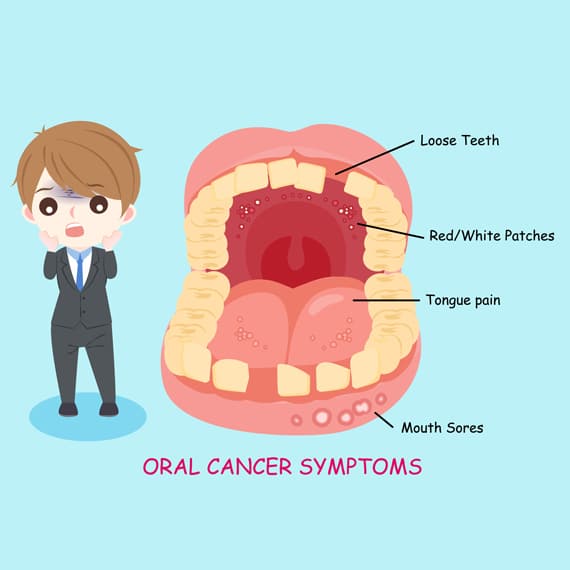
Oral Cancer and it's Symptoms
Oral cancer originates in the mouth or throat tissues. According to an NCBI study, oral cancer is a major global public health issue, particularly for dental surgeons. It is among the top ten cancer incidence rates in the world. Oral cancer screening is a procedure in which your dentist examines your mouth for signs and symptoms of cancer or precancerous diseases. This field of oral pathology aims to detect mouth cancer early when there is a better possibility of recovery.
During a regular dental checkup, your dentist may examine your mouth to check for oral cancer symptoms. Depending on your risk factors, your dentist may decide whether an oral exam or a particular test is required. There are no additional costs when the oral examination is included in your dental examination.
Risk factors for oral cancer
Tobacco usage is one of the most significant risk factors for oral cancer. Cigarette smoke, cigars, and pipes fall under this category. People who drink a lot of alcohol are also at a higher risk. Other risk factors are as follows:
- human papillomavirus (HPV) infection
- prolonged sun exposure on the face
- an earlier diagnosis of oral cancer
- a history of oral or other forms of cancer in one’s family
- a compromised immune system
- poor diet
- Inherited syndromes
Oral cancer types
Mouth cancer
Mouth cancer occurs in any of the tissues of the oral cavity. It can develop on the:
- Lips & Gums
- Tongue or Under the tongue
- The inside lining of one’s cheeks
- The palate
Pharyngeal cancer
This is a kind of throat cancer that starts in the pharynx. The following are examples of pharyngeal malignancies that arise in the neck and throat:
- Cancer of the nasopharynx occurs in the upper part of the throat
- Cancer of the oropharynx develops in the middle part of the throat
- Cancer of the hypopharynx starts in the tissues of the bottom part of the throat
Laryngeal cancer
This disease, also a kind of throat cancer, develops in the larynx, which is your voice box. Cancer can arise in the following parts of the larynx:
- supraglottis
- the glottis
- subglottis
Symptoms of oral cancer
Oral cancer symptoms include:
- a lesion on the lip or mouth that refuses to heal
- a lump or abnormal growth in any part of your mouth
- weak teeth
- discomfort or trouble swallowing
- difficulty wearing dentures
- a lump in the throat
- a persistent ear infection
- significant weight reduction
- loss of sensation in the lower lip, face, neck, or chin
- red and white spots on the mouth or lips
- scratchy throat
- jaw ache or tightness
- tongue ache
Can a dentist catch oral cancer early?
Yes. Your dentist is generally the first to identify symptoms for oral cancer. It is considerably simpler for doctors to treat oral cancer if detected early. However, most patients are diagnosed after their ailment is too severe to be adequately treated. If you see your dentist regularly and learn how to recognize abnormal changes, you will have a far greater chance of receiving a timely diagnosis. Having biannual dental exams allows your dentist to stay up to speed on your oral health.
Expectations while oral cancer screening
Below, we’ll briefly highlight oral cancer screening steps:
- Your dentist will examine the interior of your mouth for red or white spots or mouth sores
- Your dentist will also inspect the tissues in your mouth to look for lumps or abnormal growth.
- The dentist will then look for abnormalities in your throat and neck
After your oral cancer screening
What if my dentist doesn’t find anything at my oral cancer screening?
An oral cancer screening is intended to be preventative rather than diagnostic. If your dentist discovers nothing odd throughout the checkup, you may only return to regular intervals for additional screening.
What happens if my dentist finds something?
If your dentist finds any evidence of oral cancer or precancerous lesions, he or she may advise you to undergo the following procedures:
Biopsy
This treatment takes a sample of cells for laboratory testing to identify the presence of cancer cells.
Imaging Tests
A diagnostic imaging examination, which includes either CT scanning or magnetic resonance imaging (MRI), is also utilized. Imaging tests determine:
- the amount of local and regional tumor growth
- the severity of the invasion
- the amount of lymph node abnormalities
Endoscopy
Your dentist may perform an endoscopy to inspect obscure areas such as the larynx and behind the nose.
Frequently Asked Questions
What Are The Steps To Prevent Oral Cancer?
You may prevent oral cancer by obeying the following guidelines:
- Minimize or quit smoking or using tobacco products
- Consume alcohol in moderation and avoid late-night drinking
- Consume a well-balanced diet, including vitamin A-rich vegetables
- Reduce your time in the sun. Constant exposure raises the risk of lip cancer, particularly in the lower lip. Apply UV-A/B-blocking sun protection products on your skin and lips when out in the sun.
- Marijuana may also be avoided
What Is The Most Common Type Of Oral Cancer?
Lips or tongue cancer are the most common type. This is because the squamous cells in your mouth, tongue, and lips are the most prevalent site for oral cancer to grow.
Conclusion
You may discuss your anxieties about mouth cancer with your dentist during oral cancer screening. It’s natural to be concerned about the possibility of oral cancer, but engaging in this brief examination may help ease your anxieties. If your dentist discovers an oral cancer symptom, they may send you for additional testing to determine what that symptom implies. But remember that results that require more examination don’t always indicate cancer. If cancer is discovered, early detection decreases treatment-related health concerns in the future. That is why early diagnosis and prevention are so important.

